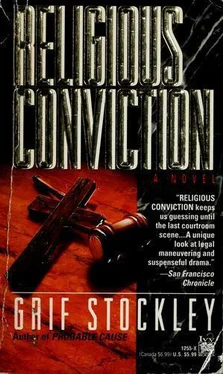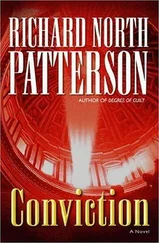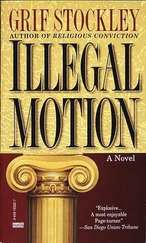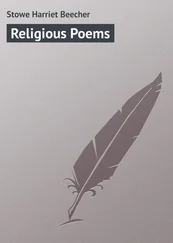Grif Stockley - Religious Conviction
Здесь есть возможность читать онлайн «Grif Stockley - Religious Conviction» весь текст электронной книги совершенно бесплатно (целиком полную версию без сокращений). В некоторых случаях можно слушать аудио, скачать через торрент в формате fb2 и присутствует краткое содержание. Жанр: Криминальный детектив, на английском языке. Описание произведения, (предисловие) а так же отзывы посетителей доступны на портале библиотеки ЛибКат.
- Название:Religious Conviction
- Автор:
- Жанр:
- Год:неизвестен
- ISBN:нет данных
- Рейтинг книги:5 / 5. Голосов: 1
-
Избранное:Добавить в избранное
- Отзывы:
-
Ваша оценка:
- 100
- 1
- 2
- 3
- 4
- 5
Religious Conviction: краткое содержание, описание и аннотация
Предлагаем к чтению аннотацию, описание, краткое содержание или предисловие (зависит от того, что написал сам автор книги «Religious Conviction»). Если вы не нашли необходимую информацию о книге — напишите в комментариях, мы постараемся отыскать её.
Religious Conviction — читать онлайн бесплатно полную книгу (весь текст) целиком
Ниже представлен текст книги, разбитый по страницам. Система сохранения места последней прочитанной страницы, позволяет с удобством читать онлайн бесплатно книгу «Religious Conviction», без необходимости каждый раз заново искать на чём Вы остановились. Поставьте закладку, и сможете в любой момент перейти на страницу, на которой закончили чтение.
Интервал:
Закладка:
Pearl Norman nods and bursts into tears. Leigh tugs at my arm and whispers, “She doesn’t know anything.”
I stand and ask Grider for a conference and he motions me and Jill to the bench. We approach and, with my back to the jury, I say quietly, “Maybe we can stipulate to her testimony. Your Honor. I understand she has areal alcohol problem.”
Grider looks at Pearl in disgust and turns to Jill.
“What do you want out of her?”
Jill shakes her head.
“I want her to tell what she knows about this case!”
For the first time Grider seems to be on my side.
“Haven’t you already interviewed her?” he asks sharply.
“Does she help the State’s case?”
Like a child being questioned by her father, Jill shifts her weight from side to side.
“I don’t know what she’s going to say under oath. Your Honor. We’ve had a few surprises already,” she adds dryly.
I look over at Leigh and suggest to Grider, “Why don’t we go ahead with her direct testimony? I’m not afraid of her.”
Grider looks past us at Pearl and says harshly, “Are you too drunk to tell the truth to this court?”
Pearl smiles foolishly at him.
“No, Judge.”
Irritably, Grider snaps, “I should hold you in contempt of court. Let’s get on with it.”
As expected, the next few minutes are a waste of time. Either Pearl cries, rambles, or gives such vague answers that the jury, now that its initial titillation at her condition has worn off, grows visibly restless and bored. All that Jill shows is that she is a strangely pathetic creature who is an embarrassment to her husband and her youngest daughter. When Jill is through with her, I let her sit down without a question. She seems so relieved it is impossible to avoid wondering if she is hiding something after all.
Jill concludes her case by calling Laura Partrain, who reinforces Shane’s testimony about the changes in his daughter caused by Art Wallace. A pillar at Christian Life, mrs. Partrain speaks of her own personal efforts to keep Leigh involved in the church. She makes real the anguish experienced by other church members.
“No matter what we said or did,” the woman, an attractive redhead, laments, “Leigh came to church less and less.
Her husband was a terrible influence on her. Leigh had been such a joy, too. We hated what was happening, but nobody could do a thing about it.”
I let mrs. Partrain go without a question, and after Grider summarily dismisses my motion to dismiss the charges, I begin our defense. Daffy is my first witness, and, as strange as he is (thank God he is wearing shoes instead of sandals), he does a decent job of piecing together Art’s scheme to launder the two hundred thousand dollars he swindled from Jack Ott. Grider gives us an unexpected break when he allows Jessie St. vrain to play the tape in which Robert Evan confessed that Jack Ott had hired him to torch a rival porno dealer’s store.
Over Jill’s vehement protest, Grider permits the recording to be admitted into evidence because Evan said on tape he was supposed to burn up the dealer as well.
However, the recording is difficult to understand and Evan sounds like the drug-crazed loony he was.
If the jury is impressed, I can’t tell by their expressions.
Jill and the cops have already emphasized to them that there was no forced entry and no sign of a struggle. If Art feared for his life, why was he sitting at his desk when he was killed? It all sounds too far out and crude for the rich neighborhoods that overlook the Arkansas River. As she steps down, I smile, at Jessie, who has done as well as she can. Although she has surprised me by keeping her promise to wear a dress, she still looks like a young boy, but she is close enough for the jury to give her the benefit of the doubt; Turning to smile at the jury as she steps off the witness stand, she seems as unlikely to have just committed a breakin as Pearl Norman.
I look over at Dan and he shakes his head. Don’t put Leigh on the witness stand. But I have to. Credibility is what this case is about. Shane has made too powerful a witness on his own behalf for me to believe that Leigh is safe. Shane may well have convinced the jury of his own innocence, but if he is telling the truth, there is no way he can save his daughter. He wasn’t there. Leigh will have to save herself.
Leigh takes the stand, and I have her tell her story. In a tense, anxious voice she sounds so much like her father I wonder if I could tell their words apart if I were reading their transcripts. Without apology, Leigh admits she was a daddy’s girl from the time she was born, and listening to her words, no one in the courtroom can escape the conclusion that they adored each other. Her one defiant act was marrying Art.
“His personality was a lot like my father’s,” she volunteers, as if it weren’t obvious.
“He was very determined and gave me a lot of attention.”
To make plain to the jury how much control Shane exercises, I ask about Pearl.
“How did your mother figure in the picture when you were growing up?”
Leigh gives me a bitter smile.
“As you saw today, my mother unfortunately has a drinking problem and has had for many years. I’m sure she’s been very lonely at times. My father has gotten attention all his life, and she has received very little. He is such a dominant personality it has been hard for her to find her own niche.
I really haven’t been very close to her.”
I nod, content with her answer. The jury has to feel the bond between Leigh and Shane if they are going to believe her story of why she lied to the police.
“I felt enormous guilt for not going to the church as regularly as I had before I married Art. The church was my whole life, and I felt terrible when Daddy would comment about my not being there.”
For the next ten minutes I get Leigh to explain her actions the morning of the trial.
“I had told Daddy that I would come to hear a missionary from Guatemala. Art wanted me to stay home, so I went up to the church twice that morning to make Daddy think I had been there all the time. I know it sounds pathetic, but I always felt so bad when he asked me to come to the church.”
Knowing Jill will ask this question if I don’t, I say, “Did you relieve those bad feelings by killing your husband?”
“No!” she exclaims.
“I loved Art. He was the smartest man I’ve ever known. And he made me feel like a person and a woman for the first time in my life.”
I steal a glance at the jury but can’t read anything. A new Art is emerging from Leigh’s lips. Gone is the terrible deceiver who seduced her away from Christianity.
She is free-lancing with this version, but intuitively she must know that if she gives the impression that she had begun to hate him, the jury will assume she had a reason to kill him. Cautiously, I go with this new, improved model.
“You loved him despite the fact,” I ask, giving her a chance to explain, “that he was a thief?”
Leigh responds earnestly, “He took the money from pornographers. I was worried about our safety, but I wasn’t upset at what he did.”
“Did you feel threatened?” I ask, watching Leigh carefully. She is fighting for her life now, but she is on thin ice.
“Of course,” she says, “but we couldn’t very well go to the police.”
I have no choice but to ask her about the video. It is a double-edged sword, equally a problem for her as well as her father.
“Why did you let your husband film you naked?” I ask, wondering how closely she will stick to the script. Whatever I argue to the jury in my closing statement about Hector and Shane, the jury will be asking itself if Leigh suddenly blew up.
Her face colors, and her voice drops into a lower register.
Читать дальшеИнтервал:
Закладка:
Похожие книги на «Religious Conviction»
Представляем Вашему вниманию похожие книги на «Religious Conviction» списком для выбора. Мы отобрали схожую по названию и смыслу литературу в надежде предоставить читателям больше вариантов отыскать новые, интересные, ещё непрочитанные произведения.
Обсуждение, отзывы о книге «Religious Conviction» и просто собственные мнения читателей. Оставьте ваши комментарии, напишите, что Вы думаете о произведении, его смысле или главных героях. Укажите что конкретно понравилось, а что нет, и почему Вы так считаете.












